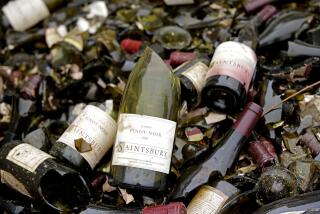A Toast to Your Cruise! Now Hand Over That Booze
- Share via
Maybe you’ve already booked a cruise to celebrate your honeymoon, anniversary or retirement. Perhaps the idea only recently arose, as you glanced at a cruise industry ad: a handsome couple gazing at a scenic sunset, elegant wine glasses at the ready.
But before you start thinking about which precious bottle you’ll be bringing along from home for your own celebratory toast at the rail, and before you daydream of rum from St. Thomas or curacao from Curacao, check the fine print in your contract of passage. Or call your cruise line and ask how it deals with bottles brought aboard ship. Because even though you’re already paying them $150 or $250 or $350 per day, the cruise lines want you to buy your booze from them and no one else.
So most lines have policies that closely restrict the imbibing of alcohol from bottles bought ashore. These policies vary widely from line to line, and are irregularly enforced. (I got started on this story, in fact, after learning of a colleague who successfully embarked recently with a contraband bottle of Dom Perignon.)
Generally the less you pay for your cruise, the more restrictive the cruise line’s policy is likely to be. But even if you’re paying $300 a day for that sense of freedom that cruise lines so heartily advertise, you may be banned from possessing booze bought on shore, even in the privacy of your own cabin.
As cruise line representatives point out, this is not a burning issue for most travelers, who are satisfied to confine their orders to refreshments found on the cruise-ship menu. But these rules are the kind of smallish thing that can become large and unpleasant if discovered incidentally, on an embarkation ramp or at a dining room table.
“That [rule] sounds to me pretty weird,” says Ed Perkins, editor of Consumer Reports Travel Letter. “It’s sort of like a hotel saying you have to use the mini-bar.”
Norwegian Cruise Line, which was the most restrictive of the six lines I quizzed, generally forbids all alcohol (no matter where it was purchased) from many public areas and from private cabins. If a passenger brings booze to a cruise’s first boarding or returns from any port calls with booze, says spokeswoman Fran Sevcik, “then we have a holding area where we keep it for them until the end of the cruise.”
Why the policy? “A big part of this really is to have control of minors getting ahold of alcohol,” Sevcik says. “In years past there have been some situations where we had underage drinking going on, and those passengers were disruptive.”
Sevcik notes that the ships’ prices are $3.95 for a martini, $2 for a bottle of domestic beer and $16 for the most affordable bottle of wine, “considerably less than you’d pay at a resort or a fine hotel.” (If passengers are determined to have drinks in their cabins, or a special private bottle in the dining room, it apparently can be arranged. Sevcik says such passengers should make advance arrangements through NCL’s passenger courtesy department in Coral Gables, Fla.)
Here’s a sampling of policies at five other major cruise lines.
Carnival Cruises, which has positioned itself as the most populist of the cruise lines, with the youngest passengers and rates that begin about $150 per day, has an official ban on passengers taking any alcohol aboard, any time. And that rule is strictly enforced at first embarkation, says spokeswoman Jennifer de la Cruz.
But if a passenger brings back a bottle in a shopping bag with other items, De la Cruz says, that infraction may go unnoticed, and “if you drink it in your cabin, so be it--that’s your business. . . . But you’re not going to get away with bringing in a large volume of drinks at a port of call. We’re going to take it from you and give it back to you at the end of the cruise.”
The reason for all this: “There are some guests who would interpret that as meaning it is OK to bring large quantities of liquor on board, and then that leads to issues of disruptive behavior. If you’re buying it on board at typical prices, it’s likely that you’re not going to consume as much as if you had 10 cases of beer in your cabin.” In addition, De la Cruz says, glass bottles inexpertly packed into luggage could pose “a minor safety issue.”
Give Carnival credit, however, for being willing to say out loud what other cruise lines wouldn’t: “It should be understandable that a cruise line would want to encourage the on-board sale of alcohol, and beverages as a whole, in the interest of generating revenue,” she says.
Carnival’s shipboard bars charge $2.95 for a domestic beer, $3.50 for a martini, $13 for their least costly bottle of conventional wine and $12 for the least expensive bottle of nonalcoholic wine.
On Crystal Cruises, which aims for the most upscale customers and frequently sets fares at $400 per person per day or more, passengers can drink their own booze in their rooms, and can take their wine to the dining room for a $10-per-bottle corkage fee. But drinks from off the ship are forbidden in other public areas.
On Holland America cruises, a spokeswoman said, the staff charges a corkage fee of $7.50 per bottle, whether it’s consumed in the dining room or other public areas, and has no restriction on alcohol in cabins.
On Princess Cruises, guests can bring their own wine to dinner and pay a $5-per-bottle corkage fee, but they are forbidden to bring shore-bought booze anywhere outside their cabins.
Reynolds travels anonymously at the newspaper’s expense, accepting no special discounts or subsidized trips. He welcomes comments and suggestions, but cannot respond individually to letters and calls. Write Travel Insider, Los Angeles Times, Times Mirror Square, Los Angeles 90053 or e-mail chris.reynolds@latimes.com.
More to Read
Sign up for The Wild
We’ll help you find the best places to hike, bike and run, as well as the perfect silent spots for meditation and yoga.
You may occasionally receive promotional content from the Los Angeles Times.







